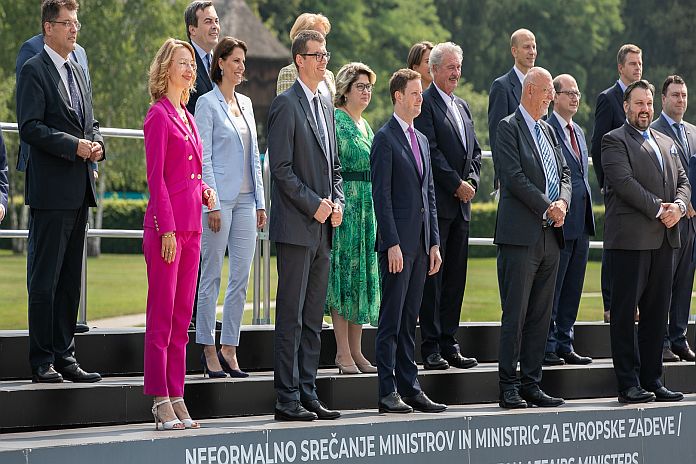BRUSSELS, Belgium — State Secretary Gašper Dovžan, president of the EU’s general affairs council, hosted an informal meeting of European affairs ministers at Brdo pri Kranju Friday; at an informal discussion on strengthening the Union’s resilience, ministers supported the efforts of the Slovenian presidency towards a more comprehensive response to crises.
“The crisis brought about by the COVID-19 pandemic has demonstrated the benefits of joint action. It is therefore paramount that we build upon the lessons learned from the pandemic and be better prepared for possible future crises. We owe European citizens a prompt, efficient and coherent response to present and future crises,” explained State Secretary Dovžan.
In his opening address, he thanked the Trio partners Germany and Portugal for intensive cooperation and successful Presidencies. In the first part of the discussion, he outlined the priorities of the Slovenian presidency for the ministers, focusing on the topics they will address at the general affairs council meetings by the end of the year, including the Conference on the Future of Europe, the rule of law, EU enlargement, and resilience. The Slovenian presidency has set the strengthening of the Union’s resilience and improving its crisis preparedness as the top priority.
The second part of the meeting, during which the Western Balkan partners joined the EU delegations, was devoted to crisis preparedness and the functioning of the Union’s internal market during crisis. In this regard, cooperation and coordination between the EU member states and cooperation across the current borders and with the Western Balkan partners are of particular importance. The health crisis has revealed many shortcomings at the European and national levels while at the same time clearly demonstrating the benefits of joint action.
“Our objective is to be better prepared for future crises, especially in public health and cybersecurity, so that we will be ready to respond quickly whenever circumstances call for a swift reaction. We need a more comprehensive approach to crisis situations and address them in a way that does not curtail fundamental European freedoms,” Gašper Dovžan State Secretary, president of the EU’s general affairs council,
European Commissioner Janez Lenarčič briefed the participants on how the experience gained from the response to the pandemic has affected the revision of the EU Civil Protection Mechanism. He stressed that during today’s debate, it was most encouraging to hear general agreement that efforts to strengthen the Union’s resilience should include ways for better anticipating various disasters and crises, as well as efforts to increase preparedness for them.
European affairs ministers will continue the discussion on the EU’s resilience and crisis preparedness at the meeting of the general affairs council in October 2021.





